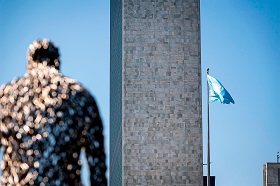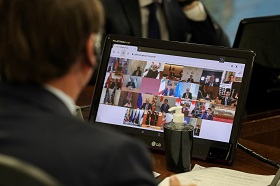Summits of the Group of Twenty sometimes evoke a déjà vu, as participants incessantly discuss roughly the same issues, including steps to keep trade open, ensure global financial stability, promote the SDGs, support the world’s poorest countries, counter economic crime and protect the environment. Year after year, G20 leaders methodically continue to launch their “grenades” into the global information space, believing that each new declaration and each new statement of their summits is, if modest, another contribution to the fight for the security and prosperity of the world at large as well as in the G20 countries themselves.
The same happened last weekend in Rome. Another political “grenade” loudly exploded, with its “informational” fragments splattering in all directions. Will they hit their targets? Will this meeting become historic to mark a new development track for world economy and global politics?
As UN Secretary General António Guterres noted on the eve of the summit, the primary goal of the discussions at the La Nuvola conference center was to restore trust among the main actors of world economy and global politics.
While all the Western leaders present in Rome, including U.S. President Joe Biden, desperately demonstrated their unbreakable unity, it is at least premature to talk whether the confidence has been re-built within the Atlantic community.
Second, it could be about restoring trust between the East and the West, countering the dangerous process of the world sliding towards a new bipolarity. But the very fact that neither President Vladimir Putin of Russia nor President Xi Jinping of China was present in Rome in person, while only resorting to video messages to the participants of the Summit, speaks for itself.
Does the global South have any reason to count on generosity and bounty from the global North, though? All this comes against the background when in spite of all the proposals to restructure the debts of low-income countries, their debt has increased by 12% during the pandemic rather than decreased—or when, contrary to the constant calls of WHO Director-General Tedros Ghebreyesus, the vaccination gap between the North and the South continues to widen rather than narrow.
Today’s G20 have fundamentally different views on the future of the world order, with their basic ideas contradicting one another. What is fair and what is unfair, legal and illegal, allowed and not allowed in world politics? Until their standpoints are brought somewhat closer, G20 meetings will look like pompous celebrations, with noisy, bright, beautiful and harmless “carnival fireworks”—rather than the scattering of “grenades”—in their wake.
Annual meetings of G20 leaders are sometimes compared to UN Security Council meetings. In both cases, the world’s most powerful nations sit together at the same table. In both cases, there is frank discussion on the most pressing problems on the international agenda. Both formats shape strategic decisions—ones designed to help resolve emerging crises, contribute to a more robust global security architecture and a bolstered world economy.
However, in terms of its impact on international affairs, the Group of Twenty is about as different from the UN Security Council as a hand grenade is from a sniper rifle. The Security Council adopts highly focused and carefully crafted resolutions largely dealing with specific crisis situations. In turn, G20 works on a larger scale in the sense that it discusses general issues of world development, touching on specific crises when it is strictly necessary.
When drafting its resolutions, the Security Council tends to be caught in a desperate struggle for every word, let alone every phrase and every paragraph. In G20 statements, preference is given to rounded, vague and compromise phrases, which do not cause fundamental objections from any participant. This is understandable, though, since UN Security Council resolutions are binding on all members of the international community, while their sabotage may lead to most painful implications, up to the use of military force against the violator. The documents adopted at G20 summits are of recommendatory nature, which means they should be supported by decisions of such organizations as the World Bank, the IMF, the WHO, the EU, etc.
This, however, does not mean that G20 is by definition a less effective institution than the Security Council. In some cases, it is reasonable to put down a sniper rifle and pick up a proven grenade. However, the potential of a hand grenade is obviously more difficult to predict, since it is almost impossible to foresee the trajectories, let alone the dispersal radius of its numerous fragments. The best way to guarantee the desired outcome is to throw grenades at the enemy, reducing the factor of randomness to a minimum.
That is why summits of the Group of Twenty sometimes evoke a déjà vu, as participants incessantly discuss roughly the same issues, including steps to keep trade open, ensure global financial stability, promote the SDGs, support the world’s poorest countries, counter economic crime and protect the environment. Year after year, G20 leaders methodically continue to launch their “grenades” into the global information space, believing that each new declaration and each new statement of their summits is, if modest, another contribution to the fight for the security and prosperity of the world at large as well as in the G20 countries themselves.
The same happened last weekend in Rome. Another political “grenade” loudly exploded, with its “informational” fragments splattering in all directions. Will they hit their targets? Will this meeting become historic to mark a new development track for world economy and global politics?
Naturally, all the right ideas about the need for international cooperation in order to combat the COVID-19 pandemic, effect a global transition to sustainable development and reduce global carbon emissions were repeatedly voiced in Rome. G20 endorsed the idea of introducing a minimum global corporate tax, also deciding to establish a working group on healthcare and finance. It is even possible that the participants of the Rome meeting will heed Vladimir Putin’s call to accelerate the mutual recognition of COVID-19 vaccines. However, as UN Secretary General António Guterres noted on the eve of the summit, the primary goal of the discussions at the La Nuvola conference center was to restore trust among the main actors of world economy and global politics.
Then, the trust of whom and to whom exactly was it supposed to be about in Rome? First, it could be about restoring confidence within the so-called “collective West”. This trust was severely undermined by the hasty and ill-organized withdrawal of U.S. troops from Afghanistan as well as by an equally hasty formation of the new AUKUS alliance, the direct consequence of which was Canberra’s unilateral rupture of the “contract of the century” for the supply of French submarines to Australia. While all the Western leaders present in Rome, including U.S. President Joe Biden, desperately demonstrated their unbreakable unity, it is at least premature to talk whether the confidence has been re-built within the Atlantic community.
Second, it could be about restoring trust between the East and the West, countering the dangerous process of the world sliding towards a new bipolarity. But the very fact that neither President Vladimir Putin of Russia nor President Xi Jinping of China was present in Rome in person, while only resorting to video messages to the participants of the Summit, speaks for itself. So, what kind of trust can we talk about if a fierce sanctions war continues along with endless talks about global solidarity between the West and the East, with the last ties between NATO and Russia severed and with new anti-Chinese blocs and partnerships established?
Third, we could discuss trust between the global North and the global South. Does the global South have any reason to count on generosity and bounty from the global North, though? All this comes against the background when in spite of all the proposals to restructure the debts of low-income countries, their debt has increased by 12% during the pandemic rather than decreased—or when, contrary to the constant calls of WHO Director-General Tedros Ghebreyesus, the vaccination gap between the North and the South continues to widen rather than narrow.
But the point is not that the interests of individual G20 nations do not completely coincide, while they significantly differ in some areas. Ultimately, there are no two countries in the world whose national interests are completely alike. The problem is that today’s G20 have fundamentally different views on the future of the world order, with their basic ideas contradicting one another. What is fair and what is unfair, legal and illegal, allowed and not allowed in world politics? Until their standpoints are brought somewhat closer, G20 meetings will look like pompous celebrations, with noisy, bright, beautiful and harmless “carnival fireworks”—rather than the scattering of “grenades”—in their wake.
First published in Izvestia.







